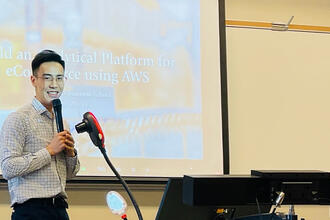
Three things that differentiate the Master of Information Technology and Business Analytics
In today’s world, the ability to understand how technology can be used to drive business and improve business operations is a significant career enhancer.
Rutgers Business School’s Master of Information Technology and Analytics provides students with knowledge and skills they can adapt to any industry, from finance to supply chain.
While the majority of students coming into the Rutgers program have strong backgrounds in technical areas, the curriculum allows them to build on their knowledge and provides them with an opportunity to learn more about the business domain that interests them.
“The program is designed to give people not just the technical knowledge but the domain and industry knowledge about the sector they plan to go into like financial or accounting, said Jeremy Guenter, the program coordinator.
There are several ways the Rutgers Master of Information Technology and Analytics provides a learning experience that's different than other similar graduate-level programs. Take a look:
1. Yes, students receive robust course material taught by world-class professors, but they are also enriched by classmates from other programs, including the Rutgers Ph.D. program, the Master of Supply Chain Analytics, and Rutgers MBA program who are able to share classes with the MITA program. The mix of students enhances the learning experience of MITA students through the exposure to different skillsets and knowledge.
2. The unique flexibility of the program allows students to tailor coursework to their specific area of interest, so they come away with a degree and, often, a specialization. While the master’s program offers three concentrations, Guenter said the ability that students have to develop specializations often gives them a competitive advantage when they enter the job market. Graduates of the program have taken jobs at Google, Salesforce and Microsoft, among others.
3. Program administrators put an emphasis on experiential learning and, more recently, on career management to better prepare students to compete for job opportunities. A significant part of the Master of Information Technology and Analytics program is an optional capstone project that provides students with the benefit of applying what they’ve learned in the program. Students work closely with a faculty member to complete the capstone, which is done as an independent study. The capstone is often done in conjunction with an internship or co-op, allowing students to work with their employer to identify a problem as their capstone project and then apply the knowledge they’ve gained in the program to develop a solution.
Photo illustration credit: Getty Images
Press: For all media inquiries see our Media Kit


